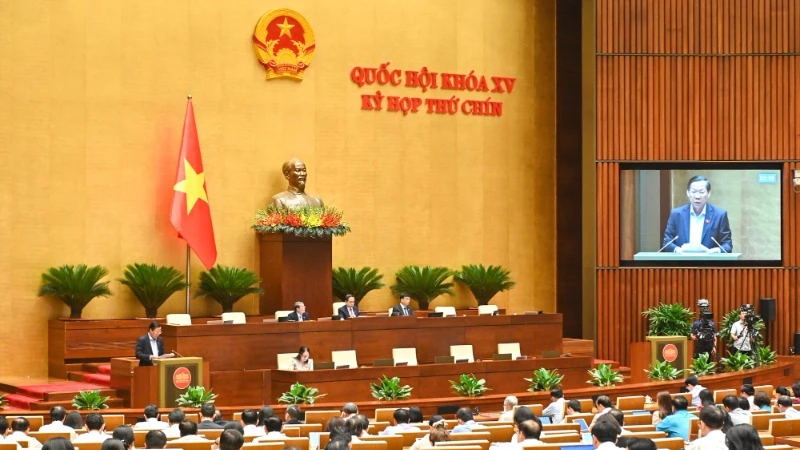 |
The National Assembly worked in the hall to listen to the Report on explanation, acceptance and revision of the draft Law on Management and Investment of State Capital in Enterprises. (Photo: BUI GIANG) |
On the morning of May 13, continuing the program of the 9th Session, the National Assembly worked in the hall to listen to the Report on explanation, reception and revision of the draft Law on Management and Investment of State Capital in Enterprises.
Presenting the report, Member of the National Assembly Standing Committee, Chairman of the National Assembly Economic and Financial Committee Phan Van Mai said: After receiving and revising, the draft Law consists of 8 Chapters and 59 articles, 3 articles less than the draft Law submitted to the National Assembly at the 8th Session.
Regarding the subjects of application, Member of the Standing Committee of the National Assembly Phan Van Mai said: Some opinions suggested studying and regulating the subjects of application including enterprises with state capital directly invested from less than 50% of charter capital. Taking into account the opinions of National Assembly deputies, the Standing Committee of the National Assembly directed to review and supplement regulations to manage enterprises with state capital directly invested from less than 50% of charter capital as "Representative of state capital invested in joint stock companies, limited liability companies with two members".
In addition, the draft Law has revised and completed the regulations on representatives of state capital in joint stock companies and limited liability companies with two or more members, ensuring coverage of the management and investment of state capital in terms of investment capital in enterprises with 50% or less state capital according to the principle that wherever there is state capital, there must be state management with appropriate measures and levels.
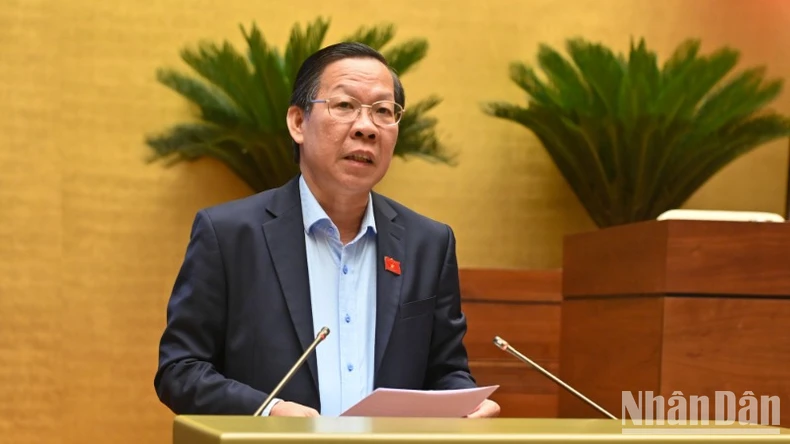 |
| Member of the National Assembly Standing Committee, Chairman of the National Assembly Economic and Financial Committee Phan Van Mai presented the report. (Photo: BUI GIANG) |
Regarding the scope of state capital investment in enterprises, many opinions suggested continuing to review and ensure compliance with the spirit of the 13th Party Congress Documents and Resolution No. 12-NQ/TW, focusing on investing capital only in a number of state-owned enterprises operating in key, essential fields or fields in which other enterprises do not invest.
Institutionalizing the Party's policy and absorbing the opinions of National Assembly deputies, the National Assembly Standing Committee has directed the review and regulation of the scope of state capital investment in enterprises, which are areas in which the state needs to invest capital to establish enterprises and invest additional state capital, including: enterprises providing essential public products and services to society; enterprises directly serving national defense and security; enterprises operating in key areas of national defense and security; enterprises operating in the field of natural monopoly; enterprises developing science and technology, innovation, national digital transformation; applying high technology, making large investments, building key and important national infrastructure works, creating momentum for rapid development for other industries, fields and the economy; enterprises in key and essential fields of the economy.
Regarding the business strategy and annual business plan of enterprises, some opinions suggested clarifying the authority to approve business strategies of agencies and organizations and regulations in the direction of creating initiative for enterprises. The National Assembly Standing Committee directed to absorb the opinions of National Assembly deputies, review and revise Article 17 of the draft Law. Accordingly, the Board of Members and the Chairman of the company decide to promulgate and adjust the business strategy and annual business plan of the enterprise based on the socio-economic development plan and the annual, basic tasks and targets assigned by the representative of the state owner; at the same time, the Government is assigned to specify this in detail.
According to National Assembly Standing Committee member Phan Van Mai, the provisions in the draft Law have decentralized the authority for enterprises to issue business strategies and annual business plans, creating initiative in managing production and business activities of enterprises, overcoming the delay due to slow approval of strategies and plans in the recent past.
Regarding regulations on capital mobilization and lending, some opinions suggested reviewing and adjusting regulations on capital mobilization of enterprises in the direction of increasing the initiative of enterprises, having a strict management and supervision mechanism; assigning enterprises to guarantee or lend capital to subsidiaries and assigning the Government to specify in detail the conditions for guarantee and lending capital. The National Assembly Standing Committee has accepted the opinions of National Assembly deputies and adjusted Article 18 of the draft Law.
“This regulation has institutionalized the Party's guiding viewpoint, increased the autonomy and self-responsibility of enterprises, helped enterprises established or invested by enterprises to access reasonable capital sources, created resources for enterprises to develop; and shifted from pre-control to post-control,” Mr. Phan Van Mai stated.
To handle practical issues arising before making fund allocations and paying to the State budget, the draft Law has been adjusted in the direction of after-tax profits after distributing profits to capital contributors under business cooperation contracts (if any); compensating for losses of previous years that have expired and are deductible from pre-tax profits according to the provisions of the Law on Corporate Income Tax; handling expenses according to the provisions of specialized laws; handling failed investment costs in investment projects with specific characteristics and high risks but not specified in specialized laws, innovation costs, failed innovation projects, costs of performing political tasks assigned by competent authorities according to the Government's regulations. The remaining amount is set aside for funds and paid to the State budget.
Source: https://huengaynay.vn/chinh-tri-xa-hoi/tang-tinh-tu-chu-tu-chiu-trach-nhiem-cua-doanh-nghiep-153551.html



![[Photo] President Luong Cuong attends the inauguration of the international container port in Hai Phong](https://vphoto.vietnam.vn/thumb/1200x675/vietnam/resource/IMAGE/2025/5/13/9544c01a03e241fdadb6f9708e1c0b65)



![[Photo] Prime Minister Pham Minh Chinh meets with US business representatives](https://vphoto.vietnam.vn/thumb/1200x675/vietnam/resource/IMAGE/2025/5/13/5bf2bff8977041adab2baf9944e547b5)

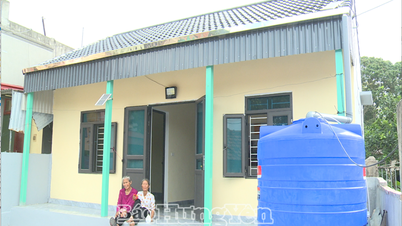

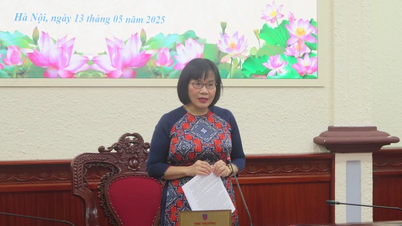







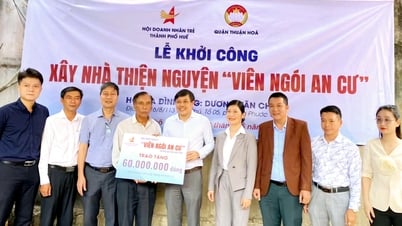
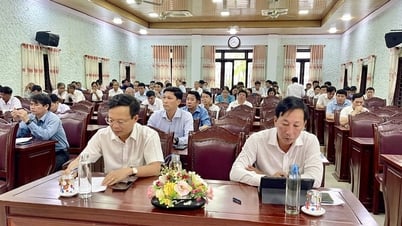





















































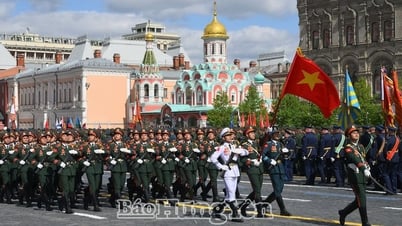







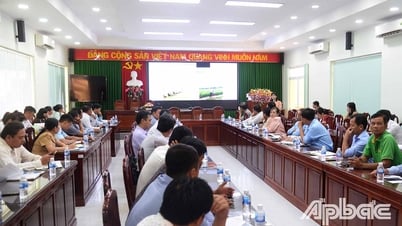












Comment (0)